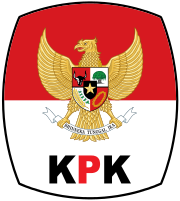Corruption Eradication Commission
| Komisi Pemberantasan Korupsi | |
 |
|
| Agency overview | |
|---|---|
| Formed | 2002 |
| Jurisdiction | Government of Indonesia |
| Headquarters | Jakarta, Indonesia |
| Agency executives |
|
| Website | www |
Indonesia's Corruption Eradication Commission (Indonesian: Komisi Pemberantasan Korupsi), abbreviated as KPK, is a government agency established to fight corruption. As of 2015, its chairman is Agus Raharjo, and its deputy chairman is Basaria Panjaitan.
Anti-corruption efforts began in Indonesia in the 1950s. Following strong criticism of corruption at the beginning of the New Order regime in the late 1960s a Commission of Four was appointed by president Suharto in 1970. The report of the commission noted that corruption was "rampant" but none of the cases it said were in need of urgent action were followed up. Laws were passed in 1999 giving the Police and prosecution service the authority to investigate corruption cases.
Law No.30/2002 on the Corruption Eradication Commission was passed in 2002 providing a legal basis for the establishment of the KPK. Since then, the Commission has engaged in significant work revealing and prosecuting cases of corruption in crucial government bodies reaching as high as the Supreme Court.
The KPK vision is to free Indonesia from corruption. Its duties include investigating and prosecuting corruption cases and monitoring the governance of the state. It has the authority to request meetings and reports in the course of its investigations. It can also authorise wiretaps, impose travel bans, request financial information about suspects, freeze financial transactions and request the assistance of other law enforcement agencies. It also has the authority to detain suspects, including well-known figures, and frequently does so.
The work of the KPK is a source of continuing controversy in Indonesia. The commission is careful, but sometimes quite aggressive, in pursuing high-profile cases. For example, in reporting on the activities of the KPK, one foreign observer noted that the commission has "confronted head-on the endemic corruption that remains as a legacy of President Suharto’s 32-year-long kleptocracy. Since it started operating in late 2003, the commission has investigated, prosecuted and achieved a 100-percent conviction rate in 86 cases of bribery and graft related to government procurements and budgets." To display once more its resolve to crack down on graft suspects, the KPK named on 7 December 2012, both brothers of Indonesian socialite Rizal Mallarangeng, Indonesia's Sports Minister and Fox Indonesia consultant Choel Mallarangeng suspects in a multimillion-dollar corruption case, in the latest scandal to hit the President Susilo Bambang Yudhoyono's ruling party ahead of Indonesia's 2014 Presidential election. Mallarangeng is the first minister to resign on graft allegations since the KPK began operating in 2003.
...
Wikipedia
